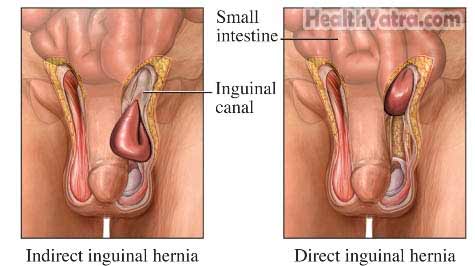Definition
This operation treats a hernia. A hernia forms when your abdominal wall weakens, bulges, or tears. This causes the inner lining of the abdomen to protrude and form a sac outside of the abdomen. Abdominal contents, such as the small intestine, can move into and get stuck in this sac.
Hernias can occur in different areas, like:
- Groin (called inguinal hernia)—the most common site
- Navel
- The site of a surgical incision
- The upper-middle abdomen
- Between the abdomen and thigh (called femoral hernia)
- Where the esophagus joins the stomach (called hiatal hernia)

Reasons for Procedure
This is done to repair the hernia. You will have surgery to prevent the hernia from becoming “strangulated” (pinched so that the blood supply is cut off). If strangulation happens, you will need immediate surgery. Without surgery, the hernia will not heal. The pain and size of the hernia usually increases over time.
Possible Complications
Complications are rare, but no procedure is completely free of risk. If you are planning to have a hernia repair, your doctor will review a list of possible complications, which may include:
- Damage to neighboring organs or structures (such as, intestine or bladder)
- Infection
- Bleeding
- Scarring
- Pneumonia and other risks of general anesthesia
Factors that may increase the risk of complications include:
- Having neurological, heart, or lung conditions
- Age: older than 70 years
- Obesity
- Smoking
- Active infection
What to Expect
Prior to Procedure
Your doctor may do the following:
- Physical exam
- Blood tests
- Urine tests
- Electrocardiogram (ECG)—a test that records the heart’s activity by measuring electrical currents through the heart muscle
- Talk to your doctor about your medicines. You may be asked to stop taking some medicines up to one week before the procedure, like:
- Aspirin or other anti-inflammatory drugs
- Blood thinners, such as clopidogrel (Plavix) or warfarin (Coumadin)
On the days before and the day of your procedure, your doctor may recommend that you:
- Follow a special diet.
- Take antibiotic medicine.
- Shower the night before, using antibacterial soap.
- Arrange for someone to drive you home and to help you at home.
- The night before, eat a light meal. Do not eat or drink anything after midnight.
- Wear comfortable clothing.
Anesthesia
Depending on the type of repair, you may receive:
- Local anesthesia—the area will be numbed
- General anesthesia—used most often, you will be asleep
Description of Procedure
Conventional Hernia Repair
An incision is made over the hernia site. The hernia will be moved back into the abdominal cavity, or the sac may be removed. The muscles around the hernia are sewn together. This will repair the hole or weakness. If the hernia is large or in the groin, a piece of mesh will be inserted. If mesh is used, the muscle is not sewn together.
Laparoscopic Hernia Repair
A laparoscope is a thin tube-shaped object with a camera on the end. It will be inserted through a small incision. The doctor will be able to see the hernia on a nearby TV. Small instruments will be inserted through other small incisions. These tools will be used to complete the repair.
After the procedure, the incisions will be closed with stitches or staples. A sterile dressing will be applied.
Immediately After Procedure
You will be taken to a recovery area. There you will receive fluids and pain medicines through an IV. If there are no problems, you will be moved to a hospital room to recover.
How Long Will It Take?
Less than two hours
Will It Hurt?
Anesthesia prevents pain during surgery. You may feel pain during recovery, but taking pain medicine will help.
Post-procedure Care
Be sure to follow your doctor’s instructions. When you return home, do the following to help ensure a smooth recovery:
- In most cases, you can return to your normal diet after a few days.
- During the first few days, slowly return to your normal routine.
- Take pain medicine as needed.
- Ask your doctor about when you can do certain activities (such as driving, sexual activity). You may need to wait 1-2 weeks.
- Ask your doctor about when it is safe to shower, bathe, or soak in water.
- Avoid excess strain (such as vigorous exercise and lifting) for 6-8 weeks.
The recovery time will be shorter for laparoscopic surgery.
There is some risk that the hernia could return. To reduce your risk:
- Maintain a healthy weight.
- Strengthen your abdominal muscles.
- Treat chronic constipation, allergies, or chronic cough.
- Eat a high-fiber diet.
Call Your Doctor
After arriving home, contact your doctor if any of the following occurs:
- Signs of infection, including fever and chills
- Redness, swelling, increasing pain, excessive bleeding, or any discharge from the incision site
- Nausea and/or vomiting that you cannot control with the medicines you were given after surgery, or which persist for more than two days after discharge from the hospital
- Pain that you cannot control with the medicines you have been given
- Pain, burning, urgency or frequency of urination, or persistent bleeding in the urine
- Excessive tenderness or swelling
- Cough, shortness of breath, or chest pain
In case of an emergency, call for medical help right away.
